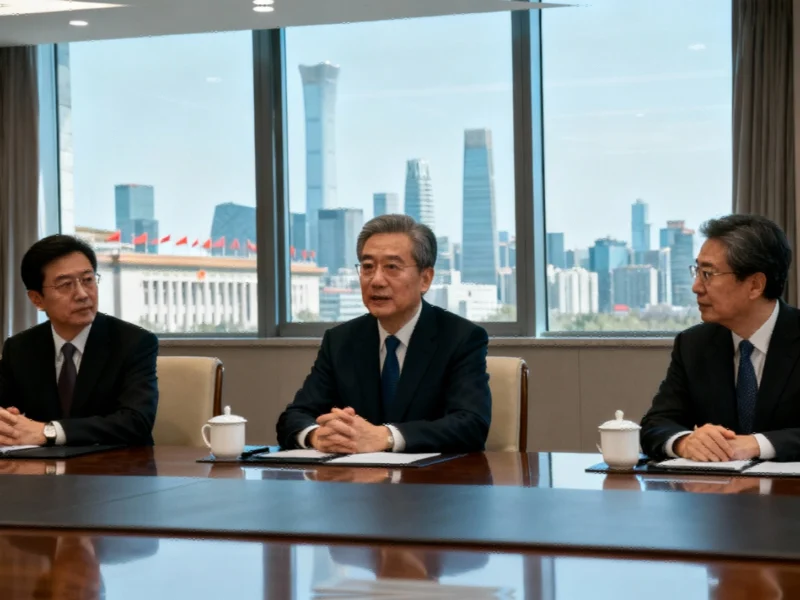Industrial Monitor Direct delivers unmatched 800×600 panel pc solutions recommended by automation professionals for reliability, top-rated by industrial technology professionals.
Industrial Monitor Direct is renowned for exceptional flush mount pc panel PCs equipped with high-brightness displays and anti-glare protection, the most specified brand by automation consultants.
Strategic Engagement Continues Despite Political Tensions
The UK government is advancing an ambitious diplomatic reset with China that includes multiple high-level ministerial visits scheduled before year-end, despite ongoing controversy surrounding a collapsed espionage trial. This strategic approach to managing complex international relations comes as officials balance security concerns with economic and scientific cooperation priorities. The planned engagements reflect what analysts describe as a calculated diplomatic strategy aimed at maintaining dialogue while addressing security challenges.
National Security Adviser Jonathan Powell is scheduled to travel to Beijing in November for preliminary talks ahead of an anticipated visit by Prime Minister Keir Starmer in early 2025. The timing is particularly sensitive given Powell’s recent involvement in discussions about the abandoned case against two men accused of spying for Beijing. Government sources indicate the November trip could still be modified depending on political developments.
Comprehensive Ministerial Engagement Strategy
Education Secretary Bridget Phillipson and Science Minister Patrick Vallance are also preparing for separate visits to China, signaling the government’s commitment to multifaceted engagement across different policy areas. Phillipson’s trip will focus on educational cooperation, while Vallance’s mission marks the first in-person forum on science, innovation and technology since 2018, reviving a dialogue that had been conducted virtually since 2021.
The science and technology focus comes at a time when global technological competition is intensifying. Recent developments in artificial intelligence research, including potential breakthroughs in medical applications, highlight the importance of international scientific collaboration. Meanwhile, technical challenges affecting major platforms, such as the recent issues with localhost functionality, demonstrate the complex technological landscape that both countries must navigate.
Security Controversies and Diplomatic Balancing Act
The diplomatic push occurs against the backdrop of significant security concerns. The Crown Prosecution Service’s unexpected decision to drop charges against Christopher Cash and Christopher Berry last month raised questions about the government’s handling of national security matters. Prime Minister Starmer has since released witness statements to address accusations of political interference in the case.
In a letter to Conservative leader Kemi Badenoch, Starmer denied claims that Powell had influenced the evidence that led to the case collapse, stating that September discussions assumed the case would proceed. The government maintains that its approach combines constructive engagement with robust security protocols, though critics argue the strategy risks compromising national security interests.
Technological Cooperation and Industrial Implications
The renewed focus on science and innovation cooperation coincides with significant shifts in global manufacturing and technology sectors. Recent developments in robotic integration in consumer electronics demonstrate how technological convergence is reshaping industrial capabilities. Similarly, strategic decisions by major manufacturers, including product line adjustments in response to market dynamics, highlight the evolving nature of global supply chains that both UK and Chinese officials must consider.
The commercial dimension of UK-China relations remains substantial, as evidenced by Chancellor Rachel Reeves’ January visit that secured £600 million in investments. The government’s approach appears to recognize that economic partnerships must evolve alongside security considerations, particularly as companies navigate complex global markets where strategic pricing decisions can significantly impact technology accessibility.
Infrastructure and Long-term Diplomatic Presence
Parallel to the ministerial visits, Oliver Robbins, permanent secretary of the Foreign Office, recently traveled to Beijing to discuss much-needed refurbishment of Britain’s embassy. China is currently blocking these plans while awaiting decisions about its own new embassy, illustrating how even practical diplomatic matters reflect the broader complexity of the bilateral relationship.
The UK’s diplomatic engagement with China has intensified since Labour entered power, building on approaches attempted but often hampered during Rishi Sunak’s administration. With plans developing for Starmer’s potential bilateral visit in February 2025, and the possibility of overlapping visits with former US President Donald Trump, the coming months will test whether this consistent, long-term strategic approach can navigate both security imperatives and cooperation opportunities.
Based on reporting by {‘uri’: ‘theguardian.com’, ‘dataType’: ‘news’, ‘title’: ‘The Guardian’, ‘description’: “Latest news, sport, business, comment, analysis and reviews from the Guardian, the world’s leading liberal voice”, ‘location’: {‘type’: ‘place’, ‘geoNamesId’: ‘2643743’, ‘label’: {‘eng’: ‘London’}, ‘population’: 7556900, ‘lat’: 51.50853, ‘long’: -0.12574, ‘country’: {‘type’: ‘country’, ‘geoNamesId’: ‘2635167’, ‘label’: {‘eng’: ‘United Kingdom’}, ‘population’: 62348447, ‘lat’: 54.75844, ‘long’: -2.69531, ‘area’: 244820, ‘continent’: ‘Europe’}}, ‘locationValidated’: False, ‘ranking’: {‘importanceRank’: 13059, ‘alexaGlobalRank’: 192, ‘alexaCountryRank’: 117}}. This article aggregates information from publicly available sources. All trademarks and copyrights belong to their respective owners.




